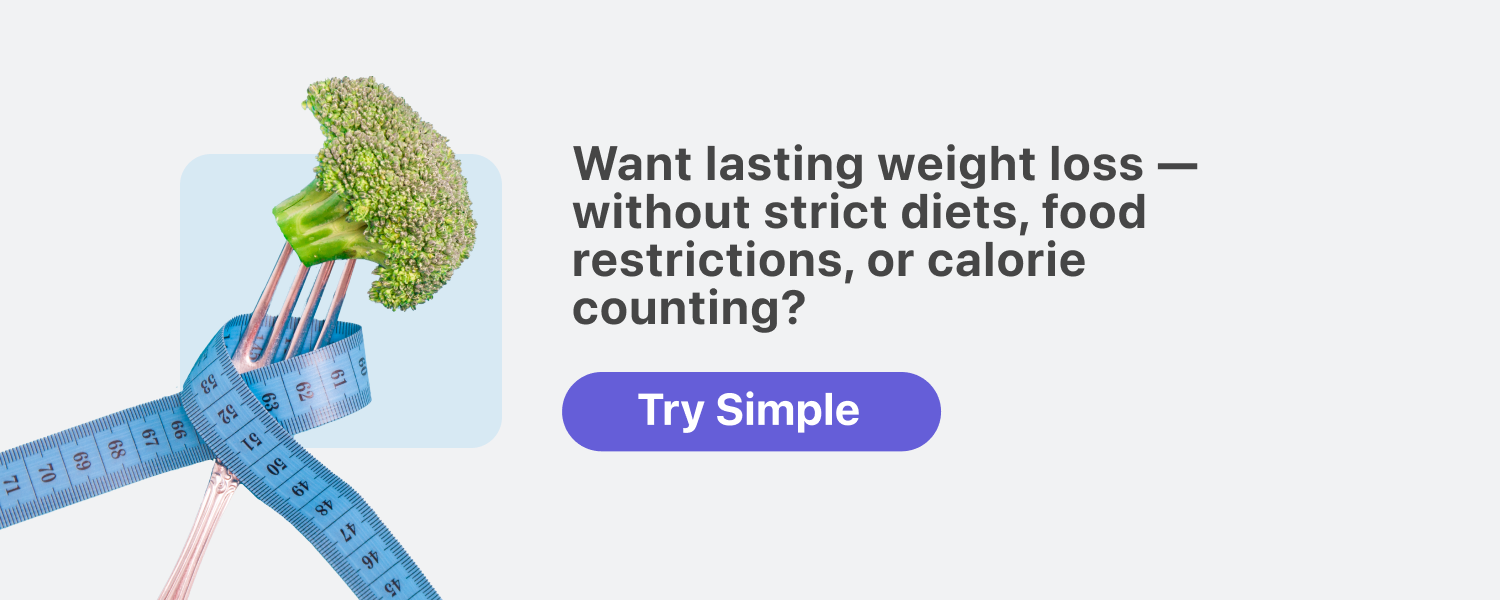Does eating small frequent meals work for weight loss?

Have you heard you’ll lose more weight if you eat frequent, small meals — and that if you don’t eat often enough, your metabolism will “slow down”?

Good news for anyone freaking out about breaking their metabolism because they missed their seventh snack of the day: this is a myth.[1]
The reality is that you don’t need to eat several small meals a day if you’re trying to lose weight.
You can, if you want — and if it works for you. Or … not.
Let’s look at how and why this works … and help ease your mind about eating frequency.
The multiple-meal myth
Decades ago, people trying to lose weight were told to eat several smaller meals throughout the day — usually around five to six times a day, every 2–3 hours.
Proponents of this practice claimed:
- Eating often would “fire up” your metabolism. (And if you didn’t eat every couple of hours, you’d go into “starvation mode.”)
- Eating often would “balance” your blood sugar.
- Eating often would make you less hungry.
It sounds logical. Yet none of these are true.
Let’s look at why.
Mythbuster 1: Frequent meals don’t increase your metabolism enough for meaningful weight loss.
It does take some energy (i.e., calories) to digest food and transport nutrients around the body.[2] And, some foods — like high-protein or high-fiber foods — do cost more energy to break down and digest. This is known as the thermic effect of food or TEF.
However, TEF only accounts for about 5% to 10% of all the calories you need to stay alive.[3,4,5]
To put this in perspective, let’s say you’re a 45-year-old woman who is 5’6” and weighs 160 pounds. You’ll need about 1,387 calories a day just to do basic biological functions, like breathing or keeping your heart pumping. This is also known as your basal metabolic rate (BMR), and this can vary depending on a few factors, including age, sex, and level of activity.[6]
Now, if we go back to how much energy it takes for your body to digest food, that’s about 5% to 10% of your BMR, which is between 70 and 139 calories … or somewhere between an apple and a banana. In other words, it’s not really a huge amount.
You could easily blow through 145 calories of food with a few extra bites — which wouldn’t be hard to do if you were eating 5–6 times a day.
So, as appealing as it is to think you’re turning your metabolism into a nuclear reactor with extra meals … it’s not really the case.[1]
Mythbuster 2: Frequent meals may not be the only way to “balance” your blood sugars.

When you eat, your blood sugar goes up. How much it goes up and how quickly depends on things like what you eat, your medical history, or whether you’ve exercised beforehand.
Then, after it peaks, it goes down again. Again, if you’ve eaten something sugary, it might drop quickly as your body works hard to bring it down again. Or it might slowly go down if you’ve enjoyed something high in fiber (such as an apple or a bowl of oatmeal) that gives you long-lasting energy.
This gave birth to the concept that your blood sugar will be more “balanced” if you periodically eat small meals. The assumption is that fewer but larger meals will cause extreme highs and lows in your glucose levels, whereas frequent, small meals will help you maintain a consistent blood sugar balance.[7]
It’s partially true but doesn’t tell the whole story.
It’s normal for blood sugar to go up after a meal and for our insulin to respond. It’s also normal for our blood sugar to then go down in response. If you have diabetes or insulin resistance, then your body is just less capable of carrying out this process efficiently.
However, it all comes down to what and how much you’re eating.
- You could frequently be eating minimally processed foods high in fiber, nutrients, healthy fats, and satiating protein, which all help your blood sugar and energy stay relatively consistent.
- Or, you could frequently be eating highly processed foods rich in fat and sugar, which could continuously keep your blood sugar levels high.
Plus, studies have shown that intermittent fasting has been linked with better blood sugar control in people living with type 2 diabetes.[8] If you do have diabetes and are thinking of fasting, please consult with your healthcare provider first before changing your eating routine.
Mythbuster 3: Frequent meals may not necessarily make you less hungry.
You’d think that you’d be less hungry by constantly grazing. And for some people, that’s true. But for others, not so much.
One study of 18 participants tells a different story.[9] Researchers measured hunger and the “desire to eat” in two groups. One group ate three meals per day, and the other six. While each group burned the same amount of calories, participants who ate more frequently said they felt hungrier, which made them want to eat even more. Other studies have shown similar results.[10,11]
Although the jury is still out, and more research is required to validate this further, what we can suggest is that for some people, eating frequently may not necessarily be the best choice to manage hunger.
What we do know from a range of studies is that intermittent fasting may help suppress your hunger levels.[12] This debunks the myth that eating frequently is the only way to manage your appetite, as fasting could be a beneficial tool in suppressing this for some people.
(BTW, if you’re curious about giving intermittent fasting a try, take our Simple quiz and get started today!)

Other issues with frequent eating
Over-focus on food
There was another unintended consequence of the 5–6 meals-a-day pattern: having to think about, acquire, and/or make food almost constantly.
Many people simply found themselves constantly preoccupied with their next meal or snack. If they missed a meal — for instance, if they were stuck on a delayed flight — they’d often feel anxious, “hangry” (hungry + angry), and worried about immediately going into “starvation mode.”
For busy people with other demands like work, family, school, travel, and so on, the 5–6 meals a day often became more of a burden than a helpful life hack.
Eating too much for weight loss
Finally, the biggest challenge with the “multiple smaller meals” approach was the overall calorie intake.
For many people, it’s hard to divide calories across six meals without each meal feeling painfully small and unsatisfying — or accidentally overshooting their daily calorie target.
How to benefit from fewer meals

OK, but what if you get hungry when eating less?
And how can you find what works best for you?
Here are some tips for balancing fasting, meal frequency, appetite, and weight loss.
Start slowly: take one snack away or adjust your meal timing
If you’re used to being a frequent eater, start small: eliminate the first or last snack of the day. If you don’t snack, you could try to have your first meal of the day a little later in the morning or your last meal of the day a little earlier.
You can also focus on making your meals more balanced by getting a good amount of leafy greens, lean protein (chicken, fish, tofu), and complex carbohydrates (quinoa, sweet potatoes, brown rice) so you’re less hungry in between meals.
(Pro tip: getting rid of an evening snack is often a good start, as most of us tend to eat more — and more mindlessly — in the evenings.)
Try a smaller eating window
If you love your frequent meals but also want to try fasting to lose weight, try getting the best of both worlds: combine a shorter eating window (say, 6–8 hours) with more frequent eating.
For instance:
- Start fasting at 6 PM; stop fasting at 10 AM the next day (16 hours).
- Between 10 AM and 6 PM: eat approximately every 2–3 hours (so, about 3–4 times over 8 hours)
Take advantage of circadian rhythms
Our circadian rhythm is our daily cycle of sleeping and waking. Emerging research is suggesting that our circadian rhythms organize most processes in our body, including our metabolism, blood sugar management, digestion, and appetite.[13]
While some research suggests that eating more and earlier in the waking period might be better for weight loss and metabolic health,[14] other research suggests that skipping breakfast may be perfectly fine for some folks who aren’t naturally hungry earlier.[15]
Practically speaking, many of us do our snacking late in the evening, so having a clear cut-off for when our fasting window starts can help you eliminate those extra calories while still flowing with your natural daily preferences.
Experiment with your fasting timing to see whether you feel less hungry at certain times and whether it works better for you to stop eating earlier in the day or start eating later. Just be mindful if you’re chopping and changing your diet to make sure you’re still eating a large variety of whole foods to maintain good health.
Check your body status
You can see how your blood sugar is adapting to your fasting periods by checking the body status feature in your Simple app.
Visualizing how your body shifts from burning mainly glucose to burning mainly fat can help you feel more confident about how fasting is improving your metabolic health.
Eat a wide variety of whole foods
When you do eat, choose a diverse range of minimally processed foods. These give you lots of valuable nutrients along with protein, healthy fats, fiber, and slow-digesting carbohydrates.[11,16,17,18]
For instance, try adding more:
- fruits and vegetables
- lean proteins (e.g., lean meats and poultry, fish and seafood, eggs, high-protein dairy like Greek yogurt, tofu, beans and legumes, etc.)
- slow-digesting complex carbohydrates (e.g., quinoa, brown or wild rice, steel-cut oats, etc.)
Need ideas for food? Check out Simple’s intermittent fasting food list: what to eat.
And, if you need some help making sure you’re eating enough whole foods, take our Simple quiz. Our food tracker will help you stay accountable and give you personalized recommendations. Plus, if you’re into intermittent fasting, we’ll get you up and running with that, too.
Track your progress
The best way to know what works for you is to track your progress toward your goals.
If your goal is to lose weight, make sure to record your weekly weight changes in your Simple app.
- If your data over a few weeks tells you that you’re moving in the right direction, great! Keep going and doing what you’re doing.
- If your weight loss has stalled or you’re gaining weight, take a closer look at what you’re doing each day and explore how you might make small adjustments.

Weight loss depends on creating a calorie deficit — expending more calories than you consume.[20] Meal frequency is just one aspect. Focus on overall calorie intake, nutrient quality, and portion control.
The body secretes enzymes and creates muscular contractions throughout the digestive system in response to food every time you eat. Many factors can influence digestion, including how much and what type of food you eat.[21]
However, it’s important to remember we go all night without eating while we’re asleep. So, it’s safe to say our bodies are designed to handle periods of fasting, and most healthy people are fine with fasting. If you do have any concerns, speak with your healthcare provider.
Athletes may have higher calorie and nutrient needs, and it may be hard for some of them to get enough energy eating less frequently. Each person is different: focus on fueling appropriately for activity level and recovery rather than eating on a rigid schedule.
If you’re highly active and/or focused on performance, we recommend consulting with a registered sports dietitian to ensure you’re meeting all your needs and fueling those wins!

- Fong M, Caterson ID, Madigan CD. Are large dinners associated with excess weight, and does eating a smaller dinner achieve greater weight loss? A systematic review and meta-analysis. Br J Nutr. 2017 Oct;118(8):616–28.
- Bo S, Fadda M, Fedele D, Pellegrini M, Ghigo E, Pellegrini N. A critical review on the role of food and nutrition in the energy balance. Nutrients. 2020 Apr 22;12(4).
- Calcagno M, Kahleova H, Alwarith J, Burgess NN, Flores RA, Busta ML, et al. The thermic effect of food: A review. J Am Coll Nutr. 2019 Aug;38(6):547–51.
- Ho KKY. Diet-induced thermogenesis: Fake friend or foe? J Endocrinol. 2018 Sep;238(3):R185–91.
- Trumbo P, Schlicker S, Yates AA, Poos M. Food and Nutrition Board of the Institute of Medicine, The National Academies. Dietary reference intakes for energy, carbohydrate, fiber, fat, fatty acids, cholesterol, protein and amino acids. J Am Diet Assoc. 2002 Nov;102(11):1621–30.
- McMurray RG, Soares J, Caspersen CJ, McCurdy T. Examining variations of resting metabolic rate of adults: A public health perspective. Med Sci Sports Exerc. 2014 Jul;46(7):1352–8.
- Alkhulaifi F, Darkoh C. Meal timing, meal frequency and metabolic syndrome. Nutrients. 2022 Apr 21;14(9).
- van den Burg EL, van Peet PG, Schoonakker MP, van de Haar DE, Numans ME, Pijl H. Metabolic impact of intermittent energy restriction and periodic fasting in patients with type 2 diabetes: A systematic review. Nutr Rev. 2023 Sep 11;81(10):1329–50.
- Ohkawara K, Cornier MA, Kohrt WM, Melanson EL. Effects of increased meal frequency on fat oxidation and perceived hunger. Obesity . 2013 Feb;21(2):336–43.
- Perrigue MM, Drewnowski A, Wang CY, Neuhouser ML. Higher eating frequency does not decrease appetite in healthy adults. J Nutr. 2016 Jan;146(1):59–64.
- Leidy HJ, Armstrong CLH, Tang M, Mattes RD, Campbell WW. The influence of higher protein intake and greater eating frequency on appetite control in overweight and obese men. Obesity . 2010 Sep;18(9):1725–32.
- Elsworth RL, Monge A, Perry R, Hinton EC, Flynn AN, Whitmarsh A, et al. The effect of intermittent fasting on appetite: A systematic review and meta-analysis. Nutrients. 2023 Jun 1;15(11).
- Reddy S, Reddy V, Sharma S. Physiology, Circadian Rhythm. StatPearls Publishing; 2023.
- Paoli A, Tinsley G, Bianco A, Moro T. The influence of meal frequency and timing on health in humans: The role of fasting. Nutrients. 2019 Mar 28;11(4).
- Dhurandhar EJ, Dawson J, Alcorn A, Larsen LH, Thomas EA, Cardel M, et al. The effectiveness of breakfast recommendations on weight loss: A randomized controlled trial. Am J Clin Nutr. 2014 Aug;100(2):507–13.
- Holt SH, Miller JC, Petocz P, Farmakalidis E. A satiety index of common foods. Eur J Clin Nutr. 1995 Sep;49(9):675–90.
- Drummen M, Tischmann L, Gatta-Cherifi B, Adam T, Westerterp-Plantenga M. Dietary protein and energy balance in relation to obesity and co-morbidities. Front Endocrinol . 2018 Aug 6;9:443.
- Leidy HJ, Clifton PM, Astrup A, Wycherley TP, Westerterp-Plantenga MS, Luscombe-Marsh ND, et al. The role of protein in weight loss and maintenance. Am J Clin Nutr. 2015 Jun;101(6):1320S – 1329S.
- Chen W, Liu X, Bao L, Yang P, Zhou H. Health effects of the time-restricted eating in adults with obesity: A systematic review and meta-analysis. Front Nutr. 2023 Feb 16;10:1079250.
- Kim JY. Optimal diet strategies for weight loss and weight loss maintenance. J Obes Metab Syndr. 2021 Mar 30;30(1):20–31.
- Livovsky DM, Pribic T, Azpiroz F. Food, eating, and the gastrointestinal tract. Nutrients. 2020 Apr 2;12(4).
